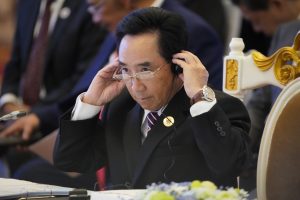On December 30, the Lao National Assembly wraps up its current session. The country’s prime minister, Phankham Viphavanh, could be out of a job by then. Your columnist is hearing rumors from Vientiane that Phankham’s fate has already been sealed. Since becoming prime minister in early 2021, Phankham has overseen a woeful pandemic year; Laos officially recorded just 41 cases in the whole of 2020 (before Phankham), but more than 110,000 by the end of 2021. The Nikkei COVID-19 Recovery Index ranked Laos as the worst performer among more than 120 countries. 2022 has been even more dire. Inflation reached 38.4 percent year on year in November, one of the highest in all of Asia. The local currency, the kip, crashed in value by as much as 68 percent against the U.S. dollar, as of October. The economy is likely to grow at just 2.5 percent, says the World Bank.
Worse, Phankham has been associated with scandal. In September, Thai authorities found the remains of a woman washed up on the Mekong. She had bullet holes in her head and was found stuffed in a suitcase. She was later identified as a Laotian millionaire, the chief executive of one of the biggest construction companies. Theories abounded. One has gained traction: She was Phankham’s mistress. Sources tell me that everyone in the capital has heard this accusation. Some aren’t dismissing it all too quickly. On top of that, there are rumors that the murdered woman’s young daughter is missing and, some say, she is Phankham’s illegitimate daughter. Added to that, there are also claims that the Chinese mafia had something to do with it, an angle that might be expected given how saturated Laos is with Chinese money (and not always legitimate Chinese money). It may be nothing, but Phankham was the former president of the Lao-Vietnam Friendship Association and isn’t considered the most pro-Beijing voice amongst Laotian politicians.
None of this, of course, can be confirmed. It probably never will be. But the scandal seems to have stuck to Phankham and it’s difficult to see how the rather awkward but serious apparatchik can wash his image. Senior leaders have been “retired” in the past because they lost the trust of party grandees and bureaucrats. And it certainly doesn’t look good that whilst the ruling Lao People’s Revolutionary Party (LPRP), the communist party, is touting its ability to crack down on corruption and organized crime, the prime minister is being publicly linked to such a scandal.
There are also personal disputes at hand. Phankham, previously a state vice president, standing secretariat member and propagandist, leapfrogged several rivals to become the new number two (up from fifth) in the Politburo at the party’s National Congress in January 2021. One apparent loser from that congress was Sonexay Siphandone, a deputy prime minister and the son of still-influential powerbroker Khamtay Siphandone. Sonexay was rumored before the congress to be the frontrunner for prime minister. Instead, he was named only number nine in the Politburo. His fortunes have improved since. Earlier this year, he was appointed chair of an emergency task force on economic matters. He delivered the main economic report to the National Assembly last week. Dynasties remain important in Lao politics. Sonexay’s father, the 98-year-old Khamtay still retains influence within the party. Sonexay’s sister, Viengthong, rose rapidly at the 2021 party congress and is now head of the Supreme Court, a powerful position over the party-led judiciary.
Analysts tell me that Sonexay, 56, is assured to become prime minister at some point. Even if Phankham survives into 2023, it’s by no means clear he’ll last the year. Laotian politicians tend to last their five-year mandates, although there is precedent for a prime minister resigning beforehand. Bouasone Bouphavanh resigned in December 2010 after four years in the job, ostensibly due to “family problems.” At the time, the analyst Martin Stuart-Fox noted that this was shorthand for “Bouasone’s recent divorce and growing resentment that his mistress had used her position to enrich herself and her family.” Many pundits speculated that Bouasone was forced out because of internal divisions within the party over policy. But, Stuart-Fox added, it was likely to do with personal rivalries. Thongsing Thammavong, who replaced Bouasone as prime minister, may have found the alliances needed to boot Bouasone out. (Perhaps, in kind, Sonexay has now found the allies needed to remove Phankham.) At the 2011 party National Congress, when the biggest decisions are made, Bouasone was also kicked out of the Politburo and Central Committee. Thongsing was bumped up to number two in the Politburo, second only to the reelected party General Secretary, Choummaly Sayasone. With some irony, Bouasone rose through the ranks thanks to patronage from Khamtay Siphandone, Sonexay’s father.
After being elected prime minister in early 2021, Phankham said that he should be judged halfway through his term, which would be toward the end of next year. It’s possible, then, that the party will give him an extra 12 months to turn things around. After all, most pundits reckon 2023 won’t be as bad economically as 2022, although that doesn’t mean things will get all that better (as your columnist wrote recently). Surging inflation, a weak currency and energy shortages have led to an unusual degree of public anger towards the communist party this year. Phankham’s rivals may attempt to cool off that public dissatisfaction by lumping the blame on a scandal-ridden, outgoing prime minister.

































